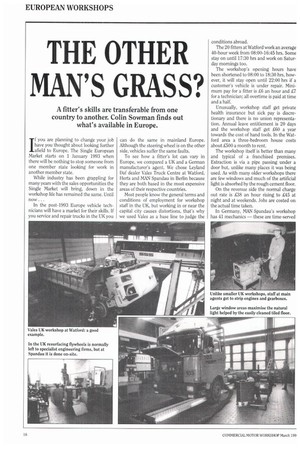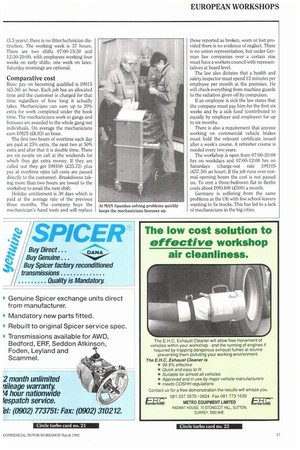THE OTHER MAN'S GRASS?
Page 100

Page 101

If you've noticed an error in this article please click here to report it so we can fix it.
A fitter's skills are transferable from one country to another. Colin Sowman finds out what's available in Europe.
If you are planning to change your job have you thought about looking further afield to Europe. The Single European Market starts on 1 January 1993 when there will be nothing to stop someone from one member state looking for work in another member state.
While industry has been grappling for many years with the sales opportunities the Single Market will bring, down in the workshop life has remained the same. Until now . . .
In the post-1993 Europe vehicle technicians will have a market for their skills. If you service and repair trucks in the 17K you can do the same in mainland Europe. Although the steering wheel is on the other side, vehicles suffer the same faults.
To see how a fitter's lot can vary in Europe, we compared a UK and a German manufacturer's agent. We chose Leyland Daf dealer Vales Truck Centre at Watford, Huts and MAN Spandau in Berlin because they are both based in the most expensive areas of their respective countries.
Most people know the general terms and conditions of employment for workshop staff in the UK, but working in or near the capital city causes distortions, that's why we used Vales as a base line to judge the conditions abroad.
The 20 fitters at Watford work an average 40-hour week from 08:00-16:45 hrs. Some stay on until 17:30 hrs and work on Saturday mornings too.
The workshop's opening hours have been shortened to 08:00 to 18:30 hrs, however, it will stay open until 22:00 hrs if a customer's vehicle is under repair. Minimum pay for a fitter is £6 an hour and £7 for a technician; all overtime is paid at time and a half.
Unusually, workshop staff get private health insurance but sick pay is discretionary and there is no union representation. Annual leave entitlement is 20 days and the workshop staff get £60 a year towards the cost of hand tools. In the Watford area a three-bedroom house costs about £500 a month to rent.
The workshop itself is better than many and typical of a franchised premises. Extraction is via a pipe passing under a door but, unlike many places it was being used. As with many older workshops there are few windows and much of the artificial light is absorbed by the rough cement floor.
On the revenue side the normal charge out rate is £38 an hour rising to £45 at night and at weekends. Jobs are costed on the actual time taken.
In Germany, MAN Spandau's workshop has 41 mechanics — these are time-served (3.5 years); there is no fitter/technician distinction. The working week is 37 hours. There are two shifts 07:00-15:30 and 12:30-20:00, with employees working four weeks on early shifts, one week on lates. Saturday mornings are optional.
Comparative cost
Basic pay on becoming qualified is DM15 (£5.36) an hour. Each job has an allocated time and the customer is charged for that time regardless of how long it actually takes. Mechanicians can earn up to 20% extra for work completed under the book time. The mechanicians work in gangs and bonuses are awarded to the whole gang not individuals. On average the mechanicians earn DM25 (£8.93) an hour.
The first two hours of overtime each day are paid at 25% extra, the next two at 50% extra and after that it is double time. There are six people on call at the weekends for which they get extra money_ If they are called out they get DM100 (£35.72) plus pay at overtime rates (all costs are passed directly to the customer). Breakdowns taking more than two hours are towed to the workshop to await the next shift.
Holiday entitlement is 30 days which is paid at the average rate of the previous three months_ The company buys the mechanician's hand tools and will replace
those reported as broken, worn or lost provided there is no evidence of neglect. There is no union representation, but under German law companies over a certain size must have a workers council with representatives at board level.
The law also dictates that a health and safety inspector must spend 12 minutes per employee per month at the premises. He will check everything from machine guards to the radiation given off by computers.
If an employee is sick the law states that the company must pay him for the first six weeks and by a sick fund (contributed to equally by employer and employee) for up to six months.
There is also a requirement that anyone working on commercial vehicle brakes must hold the relevant certificate issued after a week's course. A refresher course is needed every two years.
The workshop is open from 07:00-20:00 hrs on weekdays and 07:00-12:00 hrs on Saturdays (charge-out rate DM105 (£37.50) an hour). If the job runs over normal opening hours the cost is not passed on. To rent a three-bedroom fiat in Berlin costs about DM1400 (£500) a month.
Germany is suffering from the same problems as the UK with few school-leavers wanting to fix trucks. This has led to a lack of mechanicians in the big cities.












































































































